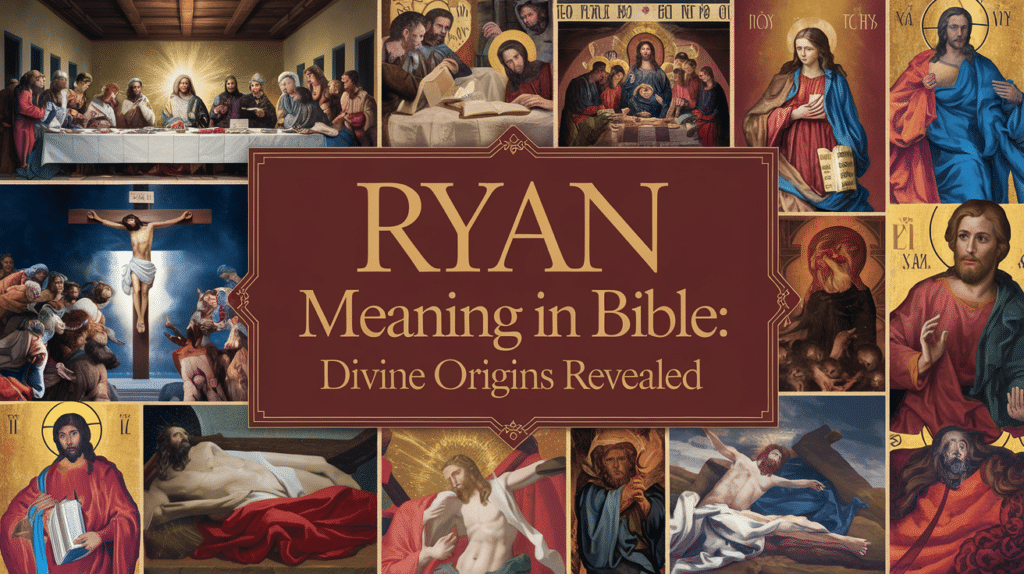Many people wonder about the spiritual significance behind their names. For those named Ryan, this question opens up an interesting expedition through ancient texts and biblical traditions.
While “Ryan” isn’t printed in the pages of the Bible, its meaning carries heartfelt connections to scriptural themes that might surprise anyone with this name.
The name Ryan, with its roots in the ancient Celtic language, has evolved across cultures and time periods, but its essence of leadership and strength resonates greatly with biblical values. And that’s what makes this study so interesting!
This Blog uncovers how this modern-day name connects to ancient biblical concepts and why understanding these origins can provide meaningful insight for anyone carrying this powerful name today.
What Are the Origins of The Name Ryan

The name Ryan does not directly appear in the Bible, but it has deep roots in both Hebrew and Christian traditions.
Its origins are often linked to the Irish Gaelic name “Rían,” meaning “little king” or “descendant of the king.”
While not explicitly biblical, the name aligns with Christian themes of leadership and authority. In biblical contexts, names often carry heartfelt spiritual significance, symbolizing strength, power, and divine purpose.
Spiritual Leadership, Strength, and Power
Spiritual leadership, strength, and power are qualities that resonate with the essence of the name Ryan. The name’s connection to kingship reflects the roles of biblical leaders chosen by God to guide His people.
These leaders, like King David and Moses, embodied courage, wisdom, and divine strength, qualities that are symbolically linked to the name Ryan.
Strength in Leadership
In the Bible, true leadership is defined by strength in both character and spirit.
A leader is not just one who rules over others but one who serves with humility, wisdom, and divine strength.
Ryan, derived from “Rían,” reflects these qualities of strength, showcasing a leadership style that is both empowering and compassionate.
Power Through Divine Purpose
The name Ryan also symbolizes power through divine purpose. Biblical figures who were called to lead, such as prophets and kings, did so not through their own might but through their alignment with God’s will.
In this sense, Ryan can be seen as a name that signifies divine empowerment, aligning its bearer with the spiritual strength and authority that come from following a higher purpose.
Finding Ryan’s Hidden Hebrew Roots

Hebrew Concepts of Kingship and Authority
While Ryan originated from Celtic culture, exploring its potential Hebrew connections reveals engrossing spiritual dimensions.
In Hebrew tradition, the concept of kingship which is central to Ryan’s meaning, is expressed through words like “melech” (king) and “sar” (prince or ruler).
These Hebrew terms appear throughout the Bible, highlighting the sacred nature of leadership that resonates with Ryan’s “kingly” essence.
The Power of Names in Hebrew Tradition
Hebrew naming traditions placed great importance on a name’s meaning, believing it shaped a person’s destiny and character.
Though not Hebrew in origin, the name Ryan shares spiritual DNA with names like Adonijah (meaning “my Lord is Jehovah”) and Malachi (meaning “my messenger”), which similarly convey authority and divine purpose.
Leadership Qualities in Ancient Hebrew Culture
In ancient Hebrew culture, leadership wasn’t just about power but about spiritual responsibility.
This connects beautifully with Ryan’s implicit meaning. The Hebrew concepts of “tohar” (purity) and “tzedek” (righteousness) were qualities expected of leaders, attributes that parents might hope for when naming a child Ryan.
The “Little King” Parallel in Biblical Narratives
Throughout biblical history, God often chose unlikely leaders, much like the meaning of “little king” suggests someone whose greatness comes not from physical stature but from inner character.
This Hebrew perspective adds a layer of meaning that alters Ryan from a simple Celtic name into one carrying a rich spiritual heritage.
Biblical Figures With Regal Names

Biblical figures with regal names often symbolize authority, leadership, and divine favor, much like the name Ryan.
One example is King David, a leader chosen by God to rule over Israel. David’s name, associated with “beloved,” echoes the strong, royal qualities seen in Ryan.
Another example is King Solomon, known for his wisdom and strength as a ruler. Solomon’s reign represents divine wisdom and justice, qualities that align with the symbolism of Ryan as a name linked to leadership and strength.
Both David and Solomon exemplify the powerful and noble traits often connected to names like Ryan, reflecting divine purpose and spiritual authority in their respective roles as kings and leaders in biblical history.
Other Variations of the Name Ryan and Their Cultural History
Ryan is a name with a rich cultural history that has transcended its Irish origins and taken root in various cultures across the globe.
While the name Ryan is commonly linked to Gaelic traditions, different versions and adaptations of the name hold unique meanings and significance in various parts of the world.
Traversing these variations provides a huge understanding of how Ryan’s legacy and symbolism have evolved over time.
The Greek Version
| Name | Ryannos |
| Origin | Greek variation of Ryan with ‘-nos’ suffix, adding strength and masculinity |
| Cultural Impact | Echoes virtues of bravery, wisdom, and divine favor, reflecting Greek values of nobility and power |
| Symbolism | Reflects nobility, power, and divine favor, linked to strength and leadership |
Spanish Influence
| Name | Rianzo |
| Origin | Spanish variation of Ryan, adapting the name to local phonetics |
| Cultural Impact | Symbolizes royalty and honor, connected to Spain’s warrior traditions and royal history |
| Symbolism | Embodies strength, nobility, and leadership, qualities admired in Spanish culture |
The Italian Perspective
| Name | Ryano |
| Origin | Italian variation of Ryan, preserving its original meaning with a melodious touch |
| Cultural Impact | Elicits images of Italian leaders and protectors, tied to Italy’s military and aristocratic history |
| Symbolism | Symbolizes authority, pride, and strength, valued in Italy’s aristocratic traditions |
The Slavic Version
| Name | Ryanko |
| Origin | Slavic variation of Ryan, linked to nobility and royal lineage |
| Cultural Impact | In Slavic cultures, associated with leadership and strength, linked to warriors and kings |
| Symbolism | Represents strength, honor, and leadership, rooted in Slavic warrior culture |
Arabic Twist
| Name | Rayyan |
| Origin | Arabic form of Ryan, meaning ‘gates of Heaven’ or ‘well-fed’ |
| Cultural Impact | Carries spiritual connotations in Arabic culture, symbolizing purity and strength |
| Symbolism | Symbolizes both physical strength and spiritual purity, a name of divine significance |
The Scandinavian Variation
| Name | Rianulf |
| Origin | Scandinavian form of Ryan, combining Ryan with ‘ulf’, meaning ‘wolf’ |
| Cultural Impact | Evokes Viking heritage, representing leadership, wisdom, and wild strength |
| Symbolism | Represents strength, leadership, and wild power, linked to Norse warrior kings |
Modern Relevance of Name Ryan

The name Ryan has seen remarkable popularity over the past several decades, particularly in English-speaking countries.
It broke into the top 100 boys’ names in America during the 1970s and reached peak popularity in the 1980s and 1990s.
Parents continue to choose this name not just for its pleasing sound but often because of the strength and leadership qualities it represents.
Growing Popularity Across Generations:
- Reached its highest U.S. ranking at #13 in 1985
- Remains consistently in the top 100 names even today
- Has spread globally beyond its Irish origins
- Appeals to parents seeking a name with strength and character
Spiritual Connection in a Modern World:
Is something many Ryans track down as they learn about their name’s heritage.
Today, many people named Ryan may not realize the spiritual significance behind their name, but understanding these roots can provide a meaningful personal connection to ancient wisdom traditions.
In a world that often feels disconnected from spiritual foundations, finding that one’s name carries echoes of biblical leadership principles can inspire a greater sense of purpose.
The name has experienced Cross-Cultural Adaptations and Variations throughout its history:
- Appears as Rian, Rayan, Ryaan across different cultures
- Adapted phonetically in languages like Arabic and Hindi
- Maintains its core meaning of leadership despite cultural differences
- Follows similar patterns to biblical names that crossed cultural boundaries
Parenting with Purpose:
Choosing Names with Meaning has become increasingly important to modern parents. For those considering the name Ryan today, understanding its rich heritage adds a meaningful dimension to their choice.
Many modern parents are returning to the ancient practice of selecting names not just for their sound or popularity, but for the values and qualities they represent; making the spiritual significance of Ryan particularly relevant in contemporary naming practices.
Summing Up
When someone introduces themselves as Ryan, there’s now a greater story to appreciate.
This name, though not directly written in biblical texts, carries threads of divine meaning that have stood the test of time.
From its Celtic beginnings to its spiritual parallels with Hebrew concepts of leadership, Ryan represents more than just a popular modern choice.
For Ryans everywhere, this heritage offers something special, a connection to timeless values of strength, leadership, and spiritual responsibility.
And for parents considering this name, there’s comfort in knowing it carries such meaningful roots.
Names shape us in subtle ways. So whether you’re a Ryan yourself or know someone who is, remember that within those five simple letters lies a rich tapestry of spiritual significance that transcends cultures and centuries.
















